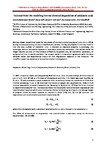Technical Note: On modelling thermo-chemical degradation of poly(lactic acid)
| dc.contributor.author | Khanlou, HM | |
| dc.contributor.author | Hall, W | |
| dc.contributor.author | Heitzman, M | |
| dc.contributor.author | Summerscales, John | |
| dc.contributor.author | Woodfield, P | |
| dc.date.accessioned | 2016-10-01T11:06:10Z | |
| dc.date.accessioned | 2016-10-04T13:15:26Z | |
| dc.date.issued | 2016-12-01 | |
| dc.identifier.issn | 0141-3910 | |
| dc.identifier.issn | 0141-3910 | |
| dc.identifier.uri | http://hdl.handle.net/10026.1/5555 | |
| dc.description.abstract |
A well-established model for simulation of the chain-scission process of polylacticacid (PLA) during thermal processing has been simplified and revised. The key assumption in the new model is that the total number of monomer units is invariant as reactions progress. Surprisingly, this seemingly obvious assumption appears to have been previously overlooked. The revised model no longer requires solution of simultaneous differential equations and, for isothermal conditions, an analytical solution is readily available. The present model is in excellent agreement with the more complex model and experimental results for PLA degradation reported in the literature. This simplified model has potential to be applied to other thermoplastics. | |
| dc.format.extent | 19-21 | |
| dc.language | en | |
| dc.language.iso | en | |
| dc.publisher | Elsevier | |
| dc.relation.replaces | http://hdl.handle.net/10026.1/5523 | |
| dc.relation.replaces | 10026.1/5523 | |
| dc.subject | Modelling | |
| dc.subject | Thermal degradation | |
| dc.subject | Polymeric material | |
| dc.subject | Chain-scission | |
| dc.subject | PLA | |
| dc.title | Technical Note: On modelling thermo-chemical degradation of poly(lactic acid) | |
| dc.type | journal-article | |
| dc.type | Journal Article | |
| plymouth.author-url | https://www.plymouth.ac.uk/staff/john-summerscales | |
| plymouth.issue | December 2016 | |
| plymouth.volume | 134 | |
| plymouth.publisher-url | http://www.journals.elsevier.com/polymer-degradation-and-stability | |
| plymouth.publication-status | Accepted | |
| plymouth.journal | Polymer Degradation and Stability | |
| dc.identifier.doi | 10.1016/j.polymdegradstab.2016.09.033 | |
| plymouth.organisational-group | /Plymouth | |
| plymouth.organisational-group | /Plymouth/Faculty of Science and Engineering | |
| plymouth.organisational-group | /Plymouth/Faculty of Science and Engineering/School of Engineering, Computing and Mathematics | |
| plymouth.organisational-group | /Plymouth/REF 2021 Researchers by UoA | |
| plymouth.organisational-group | /Plymouth/REF 2021 Researchers by UoA/UoA12 Engineering | |
| plymouth.organisational-group | /Plymouth/Research Groups | |
| plymouth.organisational-group | /Plymouth/Research Groups/Marine Institute | |
| plymouth.organisational-group | /Plymouth/Users by role | |
| plymouth.organisational-group | /Plymouth/Users by role/Academics | |
| dcterms.dateAccepted | 2016-09-26 | |
| dc.rights.embargodate | 2017-9-28 | |
| dc.identifier.eissn | 0141-3910 | |
| dc.rights.embargoperiod | Not known | |
| rioxxterms.versionofrecord | 10.1016/j.polymdegradstab.2016.09.033 | |
| rioxxterms.licenseref.uri | http://www.rioxx.net/licenses/all-rights-reserved | |
| rioxxterms.licenseref.startdate | 2016-12-01 | |
| rioxxterms.type | Journal Article/Review |


